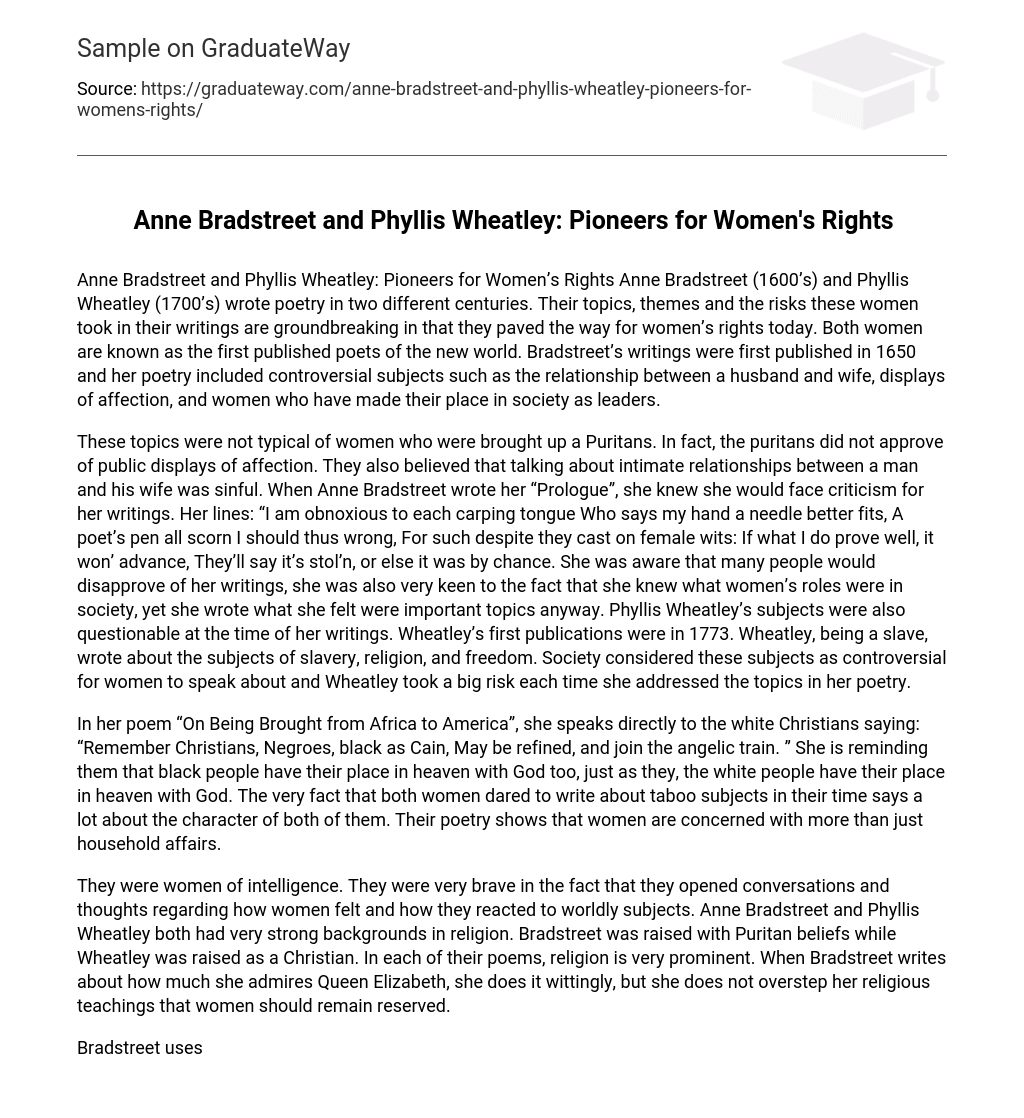Anne Bradstreet and Phyllis Wheatley are two pioneering women who wrote poetry in different centuries. Despite the risks involved, their groundbreaking writings on various topics and themes have paved the way for women’s rights today. They are acknowledged as the first published poets of the new world. Bradstreet’s work was first published in 1650 and touched on controversial matters like the dynamics between husbands and wives, displays of affection, and the achievements of women who assumed leadership roles in society.
These topics were atypical for women who were raised as Puritans. The Puritans disapproved of public displays of affection and deemed discussions about intimate relationships between a husband and wife as sinful. Despite knowing she would face criticism for her writings, Anne Bradstreet wrote her “Prologue.” In these lines, she acknowledges being subject to criticism from those who believe women are better suited for needlework than poetry: “I am obnoxious to each carping tongue Who says my hand a needle better fits, A poet’s pen all scorn I should thus wrong, For such despite they cast on female wits: If what I do prove well, it won’ advance, They’ll say it’s stol’n, or else it was by chance.” Bradstreet was fully aware of the disapproval her writings would receive, yet she felt compelled to address important topics regardless. Similarly, Phyllis Wheatley also broached controversial subjects with her writings. Wheatley, a slave, wrote about slavery, religion, and freedom in her debut publications in 1773. Society considered it controversial for women to speak on such topics, and Wheatley took a significant risk every time she delved into them in her poetry.
In her poem “On Being Brought from Africa to America”, she addresses white Christians, asserting that “Remember Christians, Negroes, black as Cain, May be refined, and join the angelic train.” This serves as a reminder that black individuals also have a place in heaven alongside white individuals. The bravery of both women writing about controversial subjects during their time demonstrates their character. Their poetry emphasizes that women are interested in matters beyond domestic affairs.
Both Anne Bradstreet and Phyllis Wheatley were intelligent and courageous women who openly discussed women’s feelings and reactions to worldly matters. Bradstreet, raised with Puritan beliefs, and Wheatley, raised as a Christian, had strong religious backgrounds. Religion plays a significant role in both poets’ works. Bradstreet admirably expresses her admiration for Queen Elizabeth while staying true to her religious teachings, which advocate for women to remain reserved.
Both Bradstreet and Wheatley incorporate religious themes in their writing. Bradstreet references the book of Genesis, comparing the queen’s fame to Babel’s walls. Meanwhile, Wheatley adopts a prayer-like language in her poems and even addresses a letter to the Honorable William of Dartmouth with religious undertones. She prays for heavenly grace to bless his work and hopes it will lead to eternal praise. Unlike Bradstreet, Wheatley shows unwavering faith in her beliefs and embraces Christianity. This stark contrast between their attitudes towards religion puts them in risky positions, as Bradstreet challenges Puritan beliefs while Wheatley delves into subjects like slavery, freedom, and religion.
Both Bradstreet and Wheatley took significant risks in speaking out against societal norms. Bradstreet’s husband held the position of governor in their community, so by expressing her opinions and challenging social norms, she jeopardized both his reputation and her family name. Wheatley, on the other hand, faced potential punishment for her writings due to her status as a slave. However, these risks did not deter either woman from denouncing the unjust world that confined women to domestic roles.
Both Bradstreet and Wheatley employed sarcasm and romantic tones in their poetry to effectively convey their messages. Additionally, they drew on their own life experiences to effectively communicate with their audiences. For instance, Bradstreet’s poem “The Poem” poses provocative questions, such as “now say have women worth? Or have they none? Or had they some but with our Queen is’t gone?” Here, she challenges women to consider their value in society after the passing of Queen Elizabeth. Bradstreet also confronts men directly, warning them that although Queen Elizabeth may be deceased, she will still vindicate the wrongs done to women. This bold move by a woman delivers a powerful message against men.
Bradstreet’s poem continues with a direct address to a lord, cautioning him while he reads her song.
Phillis Wheatley expresses her curiosity about the origin of her love for freedom in her poem “To the Right Honourable William, Earl of Dartmouth.” By recounting her personal experience of being separated from her family as a child, she aims to evoke strong emotions in her letter. Utilizing emotions and personal experiences enables poets to effectively convey their message. These techniques facilitate open communication between the poets and their readers, provoking contemplation among the audience. Were it not for the courageous and witty nature of women like Wheatley, the women’s rights movement may never have emerged.
These women were wise and brave, despite their advanced age. They took risks that ultimately benefited all women, although they may not have been aware of it at the time. They proclaimed, “I have not cheated or plagiarized, nor have I claimed someone else’s work as my own.”
References
- Franklin, Gura, Krupat, ed. The Norton Anthology of English Literature, 7th ed. , W. W Norton & Company Ltd. , 2007
- “I have neither given nor received unauthorized aid in completing this work, nor have I presented someone else’s work as my own. ”





